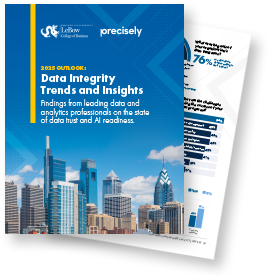
Lack of Data Integrity in Financial Institutions: How Much Is It Really Costing You?

Financial institutions are using data in a myriad of different ways, from know-your-customer (KYC) compliance to marketing insights and channel optimization, from risk assessment and fraud detection to innovative AI and machine learning initiatives. Data Integrity checks and best practices support data management as both strategic and tactical processes that enable companies to improve compliance, reduce costs, transform their customer relationships, and stay on the leading edge of innovation.
It’s all too easy for financial institutions to lose sight of the gaps in their overall data strategy. Poor data quality is one component of this, but lack of context and poor integration are equally to blame for the underperformance of data assets. This post examines the practical implications of poor data integrity. It explores the benefits of investing in a proactive approach toward improving data integrity checks, along with some real-world examples that illustrate the business value of such an approach.

Poor Data Integrity Has Real-World Consequences
In 2018, Capital One was hit with a $100 million fine by the Office of the Comptroller of the Currency. At issue was the company’s failure to adhere to guidelines aimed at curtailing money laundering. It’s interesting to note that in this case, the resulting consent decree included a statement about Capital One’s capacity to identify customer relationships that could indicate potentially fraudulent activity. Specifically, it said that “the [data management] methodology should ensure that the relationships are viewed holistically across lines of business.”
Translation: Capital One had all of the information it needed; the company simply couldn’t connect the dots. Capital One was dealing with data silos that limited it to a disjointed view of its customers. That potentially points to issues around data integration but might also suggest poor data quality. After all, it is virtually impossible to accurately match records across multiple data sources if the quality of that data is deficient. Consistency, accuracy, and completeness are essential.
HSBC fared even worse. The company was compelled to pay a $1.92 billion fine in 2012 for failing to adequately comply with KYC regulations. That led to a global review of the company’s KYC files costing an additional $700 million. In 2017, Deutsche Bank suffered a similar fate, after being hit with $630 million in fines for failing to identify suspicious trading activities associated with money laundering out of Russia.
2025 Outlook: Essential Data Integrity Insights
What’s trending in trusted data and AI readiness for 2025? The results are in!

While all three of these cases point to failures that involve KYC compliance, the negative impacts of poor data integrity issues that reach virtually every aspect of a financial organization’s business. The return of marketing spend is highly dependent on accurate, complete, and contextual data. Data enriched with geospatial variables or demographic profiles, for example, vastly increases the effectiveness of advertising promotion efforts.
Branch operations rely upon sophisticated data analysis to monitor and rate performance at the regional level and at individual branches. Risk management professionals depend on high data integrity to support sound decisions. As financial institutions roll out innovative AI and machine learning to support improved fraud detection or other key initiatives, they must carefully address the integrity of the data feeding those systems.
When those systems suffer as a result of poor data integrity, the costs can be enormous. Banks invest hundreds of millions (and very often, billions) in technology that promises to help them be more successful, but if they’re feeding those systems with poor-quality data, those investments will underperform at best. At worst, they’ll be scrapped altogether.

Rising to the Challenge: Investing in Proactive Data Checks
As with so many other endeavors, proactiveness pays. By making data integrity a priority, managers at financial institutions can pave the way for healthy, scalable growth. Those who take a reactive stance, in contrast, will eventually experience an erosion of data quality, which destroys trust in the data and ultimately inhibits healthy, sustainable growth.
It may be helpful at this point to note the relationship between data quality and data integrity. Data quality refers to the fitness of a data set to serve the specific needs of an organization. Key attributes of data quality include accuracy, completeness, timeliness, and accessibility.
Data integrity includes data quality but also comprises other factors such as consistency, connectedness (integration), and context. Geospatial intelligence is a key component of data integrity.
By investing in data enrichment, integration, and location intelligence, financial institutions can more effectively connect the dots, viewing their data holistically and achieving better results. Remember that Capital One fine? That was all about the company’s inability to understand its customer relationships holistically.
Use Cases
Precisely offers a complete range of tools that together make up our Data Integrity Suite. These include tools for integrating data from traditional and modern cloud-based data platforms Creating and maintaining data catalogs integrated with data quality tools that offer rules-based mechanisms and workflows for building and maintaining high levels of data quality at scale, and location intelligence and data enrichment tools that add valuable context.
When a large US bank with over 18 million customers needed to develop a holistic view of customer relationships, it turned to Precisely to help connect the dots. That led to a 35% increase in investigative efficiency after just 6 months.
When another large US bank was getting too many false positives from its KYC alert system, the company engaged Precisely to help build stronger data integrity. After a six-week implementation, the bank achieved a 58% reduction in alerts, saving time and money while increasing customer satisfaction.
A global bank based in the United States faced even bigger challenges when it called Precisely in for help. Regulators were requiring the bank to identify all high-risk customers throughout the world, across all of its IT systems. Initially, the company set out to assemble the data manually. That proved to be an overwhelming task. Precisely brought automation into the picture, giving the bank an efficient means of collating the necessary information, saving tens of millions of dollars in the process.
Whether your organization is struggling with KYC compliance or just wants to improve the efficiency and effectiveness of marketing spend, Precisely can help. Our Data Integrity Suite is used by many of the largest, most successful organizations in the world.
Building trust is foundational to how organizations are creating enterprise intelligence to compete in a digital-first world, but there is a significant gap between expectations and reality in the level of data trust.
Precisely the global leader in data integrity, in partnership with the Center for Applied AI and Business Analytics at Drexel University’s LeBow College of Business, surveyed 565 data and analytics professionals on their organizations’ data strategies, priorities, challenges and the state of data trust and AI readiness. The results are in, read the report today! 2025 Outlook: Essential Data Integrity Insights


